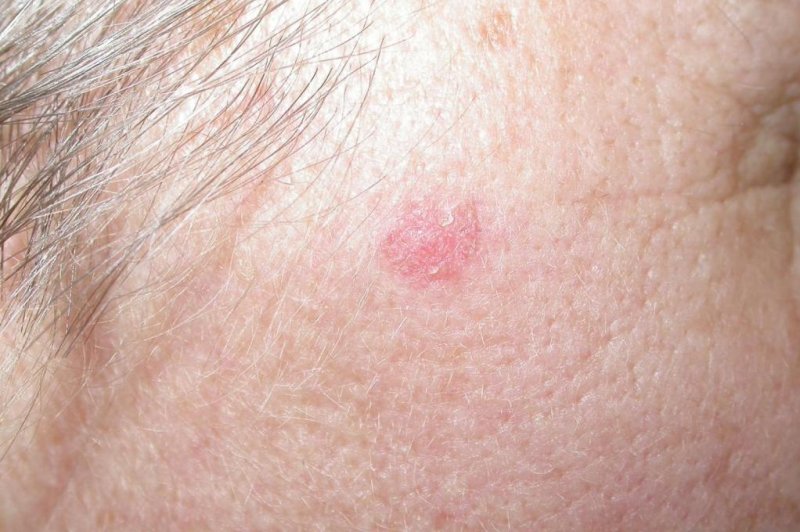An example of a superficial basal cell carcinoma lesion that could be treated with imiquimod, a topical skin cream that may provide an alternative to surgery. Photo courtesy Journal of Investigative Dermatology
PHILADELPHIA, Dec. 13 (UPI) -- A promising new treatment for basal cell carcinoma, a form of skin cancer, may provide an alternative to surgery, according to a new study.
Basal cell carcinoma is the most common form of cancer with rates rising as much as 10 percent a year, according to reports.
A new study published in the Journal of Investigative Dermatology looked at the effectiveness of the topical skin cream imiquimod in treating low-risk basal cell carcinoma lesions over a five-year period by boosting the body's immune response.
Up to this point, the leading treatment for basal cell carcinoma was excision or Mohs surgery requiring a dermatologist or plastic surgeon.
This study is a continuation of a previous study that followed a group of basal cell carcinoma patients being treated with imiquimod for three years.
After three years,researchers recorded an 83.6 percent success rate for patients treated with imiquimod versus 98.4 percent treated with surgery. Following up for the next two years for the latest study, 82.5 percent of patients using imiquimod had successful outcomes at the five-year mark compared to 97.7 percent who were treated with surgery.
While the success rate of imiquimod was lower than that of traditional surgery, the results are promising, according to researchers.
"The absolute response rate for topical imiquimod of 83 percent at five years, although clearly inferior to the 98 percent for excisional surgery for low-risk BCC, might still represent a clinically useful treatment modality, because a cream treatment can be carried out in a primary care setting, and some patients may also prefer the option of a cream rather than surgery," said Hywel C. Williams, DSc, FMedSci, NIHR senior investigator, Professor of Dermato-Epidemiology and co-director of the Centre of Evidence-Based Dermatology at the University of Nottingham, UK, in a press release.
One concern is that the use of topical treatments instead of surgery could leave patients open to "submarine lesions," which can emerge once the initial cancer has been treated.
"Most treatment failures with topical imiquimod occurred in the first year of treatment, a finding that throws light on the possible mechanisms of topical immunotherapy of skin cancer, suggesting that once an immunological response has occurred, such a response is sustained, " Williams stated in a press release.
The potential of this treatment could help free up resources for providers and allow for more options for patients moving forward.















